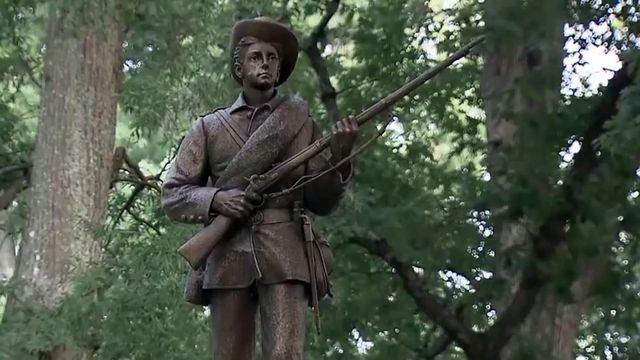Lawyer: Extra $75,000 in 'Silent Sam' deal like 'prenuptial agreement' with UNC
In the latest twist to the University of North Carolina system's $2.5 million deal with a neo-Confederate group to take the controversial "Silent Sam" monument off UNC-Chapel Hill's hands, it appears UNC provided the group with the money it needed to extract the settlement.
Posted — UpdatedThe state chapter of the Sons of Confederate Veterans sued UNC on Nov. 27, asking a judge to force the university to return Silent Sam to the Chapel Hill campus, where it stood for more than a century protesters tore it down in August 2018. In the alternative, the suit said, the court could turn the monument over to the SCV, along with a trust fund to pay for its preservation.
But $75,000 also happened to be the amount the SCV needed to secure ownership of Silent Sam from the United Daughters of the Confederacy, according to Boyd Sturges, a Louisburg attorney who represent the SCV.
By agreeing that UNC would pay a dollar less than the $75,000, the two sides skirted a review of the deal by the state Attorney General's Office, which looks at all agreements involving state agencies of at least $75,000.
Once the SCV had an ownership stake in Silent Sam, it had the legal standing to sue UNC over it.
Sturges wouldn't confirm Friday that UNC knowingly gave the SCV the money needed to sue the university system, saying only that he asked for $75,000 upfront because he didn’t want the group to be out the money spent to acquire Silent Sam if the UNC Board of Governors and Baddour didn’t approve the $2.5 million deal.
"It's kind of like a pre-nuptial agreement," Sturges said. "There was no absolute guarantee that that deal would go through."
UNC officials didn't respond Friday to requests for comment.
The brief points to an affidavit from former University Historian Cecelia Moore, who retired in August. Following news of the settlement, Moore compiled a historical record detailing the process of building the monument, and she said she found no evidence of a formal agreement between the UDC and UNC-Chapel Hill.
The alumni's brief also references Moore's research as proof that the settlement overstates the UDC's fundraising role in building the monument.
"[T]he UDC was able to raise only about one-third of the UNC Confederate monument's costs," Moore wrote. "[UNC President Francis] Venable raised the bulk of the funds from UNC alumni, and ... their collective efforts ultimately fell short by $500, which the UNC trustees paid out of University funds in 1914."
Meanwhile, even before any of the deals were signed, text messages show Baddour was working behind the scenes with Sturges and Ripley Rand, an outside lawyer hired by the state to negotiate on behalf of the Board of Governors.
The following week, as the UNC Board of Governors was signing off on the $2.5 million Silent Sam deal and the SCV's lawsuit was being filed, Rand and Baddour again swapped texts.
"Apparently they will vote in about 10 minutes," Rand texted. "We are going over now."
"Good," Baddour replied. "15 minutes out. Had to get off [Interstate] 40. Accident."
• Credits
Copyright 2024 by Capitol Broadcasting Company. All rights reserved. This material may not be published, broadcast, rewritten or redistributed.






